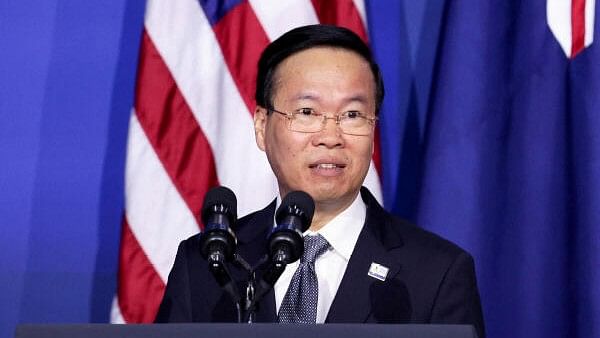
Former Vietnam President Vo Van Thuong.
Credit: Reuters Photo
Hanoi: Vietnam's once-staid political scene has erupted into turmoil with the forced resignation of a second president in just over a year amid constant political intrigue.
The political upheaval is making foreign investors nervous in a country where they have committed hundreds of billions of dollars, mostly in factories that export to America and Europe.
No major change is expected in key policies, such as foreign affairs or the openness to trade and foreign investment, but the new normal of unpredicted reshuffles may dent leaders' credibility and slows an already cumbersome bureaucracy, several analysts said.
A cursed job
Vo Van Thuong, 53, was effectively dismissed by the ruling Communist Party for unspecified wrongdoing, after he had spent just a year on the job.
He was seen as a rising star, the youngest member of the party's mighty Politburo, and a protege of the party chief Nguyen Phu Trong. His fall was as sudden as his rise from a relatively low position within the party ranks.
Before him, Nguyen Xuan Phuc was also unexpectedly forced to leave last year for "violations and wrongdoing", after less than two years on the presidential job. He had been credited with supporting pro-business reforms in his previous position as prime minister.
In 2018, the then president Tran Dai Quang suddenly passed away at the age of 61, prompting Trong to assume the presidency for a couple of years alongside his top job at the party.
The big four
Vietnam has no paramount ruler and is officially led by the four "pillars" - the party chief, the president, the prime minister and the parliament chairman.
The Party's General Secretary is the most powerful figure in Vietnam. Trong, the current chief, is a 79-year-old Marxist-Leninist ideologue who took office in 2011 and is recently mostly known for his "burning furnace" anti-graft campaign that has seen hundreds of senior officials and corporate executives prosecuted. His third term is scheduled to end in 2026.
The president holds a five-year largely ceremonial role, but can build personal relations with foreign leaders, signs international agreements and represents the nation in high-level meetings.
The prime minister has executive powers and plays an important role in shaping legislation. Current prime minister Pham Minh Chinh, 65, is a career security officer who has presided over an average annual growth of 5.2 per cent since he took office in 2021.
The Chairman of the National Assembly is Vuong Dinh Hue, 67, a trained economist and former deputy prime minister, who has been touted as a possible candidate for the party secretary position. The parliament often rubber-stamps party's decisions, but it can significantly tweak proposed legislation and even block it.
Who could be the next President?
The parliament on Thursday named Vice President Vo Thi Anh Xuan as acting president, a job she shortly held last year when the former president quit.
The presidential term, like all top jobs, expires in 2026, but the party is likely to prefer electing a permanent president for the next two years.
The election may take place in May when parliament holds its next regular plenary session, unless a special meeting is convened earlier.
Leading candidates for the permanent position include the powerful minister of public security, To Lam, and party veteran Truong Thi Mai, according to multiple analysts.
However, the former may be interested in the much more powerful position of party chief.
Mai's job had been seen at risk amid the latest leadership reshuffle, but no decision was announced about her on Wednesday.
Other names that circulate among analysts, diplomats and officials are defence minister Phan Van Giang and Ho Chi Minh City Party Secretary Nguyen Van Nen.
Nen and Mai have the possible advantage of hailing from the country's south, Thuong having being the only southerner among the big four.
A larger reshuffle is not ruled out either, whereby the prime minister or the head of the parliament would take over the presidency, relinquishing one of their respective positions.